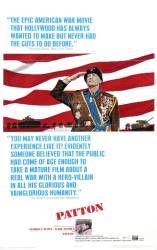Factual error: During the early portions of the film, General Bradley's Jeep is a proper WWII Willys Jeep Model MB (wipers on top of windshield), but the second Jeep that follows Bradley's is a 1950-1952 Model M38 (wipers below windshield) which won't exist until five years after WWII ends. (00:10:00)
Continuity mistake: When the two Jeeps arrive at the Kasserine Pass to survey the results of the battle, the second Jeep comes to stop just short of running over a dead soldier. At the end of the scene, the same Jeep drives away, going forward as if to run over that body, but the body has vanished. (00:10:05 - 00:11:40)
Continuity mistake: When the three small boys run up and salute Patton, the middle boy stops with the other two slightly behind him to each side, and is the first to salute. When the camera angle changes to view them from in front, the middle boy is instantly behind the other two, and is the last to salute. (00:26:00)
Continuity mistake: When the Germans attack during the discussion about air support, Patton's office gets shot up. In one shot we see bullets strafe a wall with a vase in front of it - the vase wobbles but remains intact. Then we see another shot of the same wall/vase combo being strafed - you can see marks on the wall where the bullet impacts are about to be, and this time the vase shatters too. (00:34:05)
Factual error: At the end of Patton's speech in Knutsford, just when the marching band starts playing, you can see a modern (in 1970) tanker truck driving in the background for a couple of seconds. (01:55:50)
Factual error: When Patton orders his driver to drive to the Carthaginian battlefield he addresses him as "sergeant". He is, however, wearing corporal's chevrons. A famous stickler for discipline and ceremonial, Patton is not likely to have made a mistake like this.
Factual error: In one scene of the film, Rommel is shown wearing a swastika pin. Rommel was not a member of the Nazi party and refused to wear any Nazi insignia (outside of uniform symbols which contained it), instead he wore the traditional Prussian Iron Cross.
Revealing mistake: Several maps of Europe shown in the film have Germany divided into East and West, and show national borders from 1945 onwards.
Factual error: The British drum major in the Messina parade gives the order "Forward March". This is only used by the British forces when troops are marking time. If at the halt, as here, the order is "Quick March".
Continuity mistake: In the scene before Patton hears the news of getting relieved of command, he is walking with his NCO aide George, who is wearing E6 rank on his shirt. In the following scene while getting ready for bed, the same sergeant is now wearing E5 rank.
Factual error: When Patton is given command of Third Army in France in 1944, he says that the assassination attempt on Hitler took place several days ago. Later on we see Field Marshal Rommel in a German command HQ looking quite healthy. Rommel was actually severely wounded three days prior to the attempt on Hitler and was in the hospital.
Other mistake: During the early part of the movie, when Patton is in Morocco, you can see two kids visibly mugging for the camera as they do cutaways on two distinct occasions.
Factual error: In a scene set in 1944 France, shortly after D-Day, Patton is riding in a very distinctive type of Jeep that first went into production in 1953. Another Jeep in that same scene dates from 1950 onwards.
Factual error: In the scene of the high level meeting during the initial stages of the Battle of the Bulge, Bedell Smith is conducting the meeting in General Eisenhower's behalf. In fact, General Eisenhower was present at the meeting.
Factual error: As Patton and his men drive into Palermo, they are greeted by throngs of people on either side of the road, who are obviously hired extras, as they have newer hairstyles and are dressed in modern (for 1970) clothes.
Factual error: In the washroom scene where Gen. Montogomery is speaking with Gen. Smith; Monty breathes on the mirror in order to make a drawing of Sicily. The condensed "breath" remains far too long, the same happens when Smith makes his drawing on the mirror.
Factual error: Patton arrives at Bradley's mobile HQ just after D-Day. As his jeep pulls up you can see the truck that pulls the HQ trailer. It appears to be a Mack Model "B", which did not enter production until 1953.
Factual error: Before the Battle of El Gattar, Patton is shown reading a book on tank warfare purportedly written by Field Marshal Rommel, his German opponent. Rommel in fact wrote a book on infantry fighting and tactics based on his experiences in World War I. He never wrote a book on tank combat.
Factual error: In the scene in North Africa when Patton's units ambushes the German Tanks and Infantry, All of the German tanks look like American M48 tanks and none of the American tanks are WW II Shermans.
Revealing mistake: In the beginning of the movie when the child is trying to remove the ring from a dead American soldier it is obvious that he is pulling on the finger and not the ring.






Answer: In real life Patton spoke with a high pitched effeminate voice, not the gruff George C Scott type of voice.
stiiggy